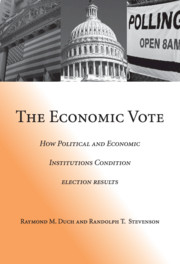Book contents
- Frontmatter
- Contents
- Preface
- 1 Introduction
- Part I Describing the Economic Vote in Western Democracies
- Part II A Contextual Theory of Rational Retrospective Economic Voting: Competency Signals
- 5 Competency Signals and Rational Retrospective Economic Voting
- 6 What Do Voters Know about Economic Variation and Its Sources?
- 7 Political Control of the Economy
- Part III A Contextual Theory of Rational Retrospective Economic Voting: Strategic Voting
- Part IV Conclusion and Summary
- Appendix A
- Appendix B
- Appendix C
- References
- Index
- Cambridge Cultural Social Studies
5 - Competency Signals and Rational Retrospective Economic Voting
Published online by Cambridge University Press: 06 July 2010
- Frontmatter
- Contents
- Preface
- 1 Introduction
- Part I Describing the Economic Vote in Western Democracies
- Part II A Contextual Theory of Rational Retrospective Economic Voting: Competency Signals
- 5 Competency Signals and Rational Retrospective Economic Voting
- 6 What Do Voters Know about Economic Variation and Its Sources?
- 7 Political Control of the Economy
- Part III A Contextual Theory of Rational Retrospective Economic Voting: Strategic Voting
- Part IV Conclusion and Summary
- Appendix A
- Appendix B
- Appendix C
- References
- Index
- Cambridge Cultural Social Studies
Summary
INTRODUCTION
In Chapter 3, we highlighted the extent to which economic voting varies from one context to the next. For example, Figure 3.2 from Chapter 3 suggested that in 1985, economic evaluations in the Netherlands had a rather significant impact on vote choice but, ten years later, economic assessments had no effect on the Dutch vote decision. In this chapter, we begin building our explanation for this kind of variation in economic voting. As we discussed in Chapter 2, modeling vote choice is equivalent to properly specifying the voter's value function for each alternative in her choice set (i.e., each party or candidate). The question then becomes: What should these value functions that produce economic voting look like? And how will their parameters vary in different political and economic contexts to produce variation in the economic vote?
THE COMPETENCY MODEL WITH TWO-PARTY COMPETITION FOR A UNIFIED EXECUTIVE
We begin to answer these questions with a theoretical model of economic voting in which the previous economy enters the voter's value function for parties modified by a competency signal. Alesina and Rosenthal (1995) and Persson and Tabellini (1990) have suggested two closely related formal models both with rational, expected utility maximizing voters who maximize their utility by conditioning their electoral choice on the retrospective performance of the economy. The models differ in their assumptions about the information available to voters when they form their expectations about what economic policies politicians will pursue.
- Type
- Chapter
- Information
- The Economic VoteHow Political and Economic Institutions Condition Election Results, pp. 131 - 147Publisher: Cambridge University PressPrint publication year: 2008



